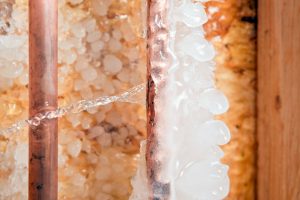Temperatures are dropping more with each passing week, and with these lower temperatures comes the risk of frozen pipes. This is definitely a headache you want to avoid if at all possible. Keep reading to learn about when your pipes are at risk of freezing and how to prevent it from happening.
If your pipes do freeze and burst, give our team a call to schedule pipe repairs in De Pere. After we repair the damage, we can talk to you about how to prevent the problem from happening again in the future. Remember that proactive maintenance is always easier and more affordable compared to investing in expensive repairs later on.
Why Do Pipes Freeze?
Pipes freeze in the wintertime as temperatures dip below freezing. The water in the lines turns into ice, blocking water flow until the temperatures warm up and the water can thaw again. This can impact water coming into your home, water draining away from your home, or both. Sometimes pipes only freeze in a small area while other times the problem is more widespread.
Tips for Protecting Pipes This Winter Season
It’s important to pay close attention to the weather forecast in our area so you know when to expect below-freezing temperatures. Precautions that you can take in advance include:
Close your garage door. Even if your garage door isn’t insulated, closing it can help protect pipes that run through your garage, including your water heater. You have pipes in the walls, ceiling, and foundation that are susceptible to freezing day or night.
Set faucets to drip. If faucets around your home are dripping, water is constantly moving through the lines and reducing the likelihood that it will freeze. If they do freeze, this can alleviate the pressure buildup so that they don’t burst as a result.
Maintain heat. Heating your home in the wintertime can be expensive, but running your heater isn’t only about comfort. Set your heater to at least 50 degrees, even when you’re not at home. Maintaining some level of heat will help to prevent frozen pipes by keeping the indoor air temperature higher and thus heating your indoor pipes.
Open cabinet doors. When you open the cabinet doors underneath kitchen and bathroom sinks, you expose those pipes to the heat from your home. This is a small step to take that can help tremendously in preventing frozen pipes.
Be proactive before leaving town. Take precautions even if you check the weather forecast and it looks like everything will be fine. You never know when weather conditions will shift unexpectedly. It’s better to be safe and implement the steps above than to come home to find frozen or burst pipes.
What Happens if Pipes Freeze?
Even with the best precautions in place, sometimes temperatures dip low enough that pipes inevitably freeze. If you suspect that you have frozen pipes, give us a call ASAP. We can help repair any damage that occurs. The biggest issue with pipes freezing is that the water inside the lines expands and causes the pipes to burst, leaving you with persistent leaks and potentially low water pressure.
Trust Tureks Plumbing Services for Terrific People, Terrific Service. Get in touch with our team today.


